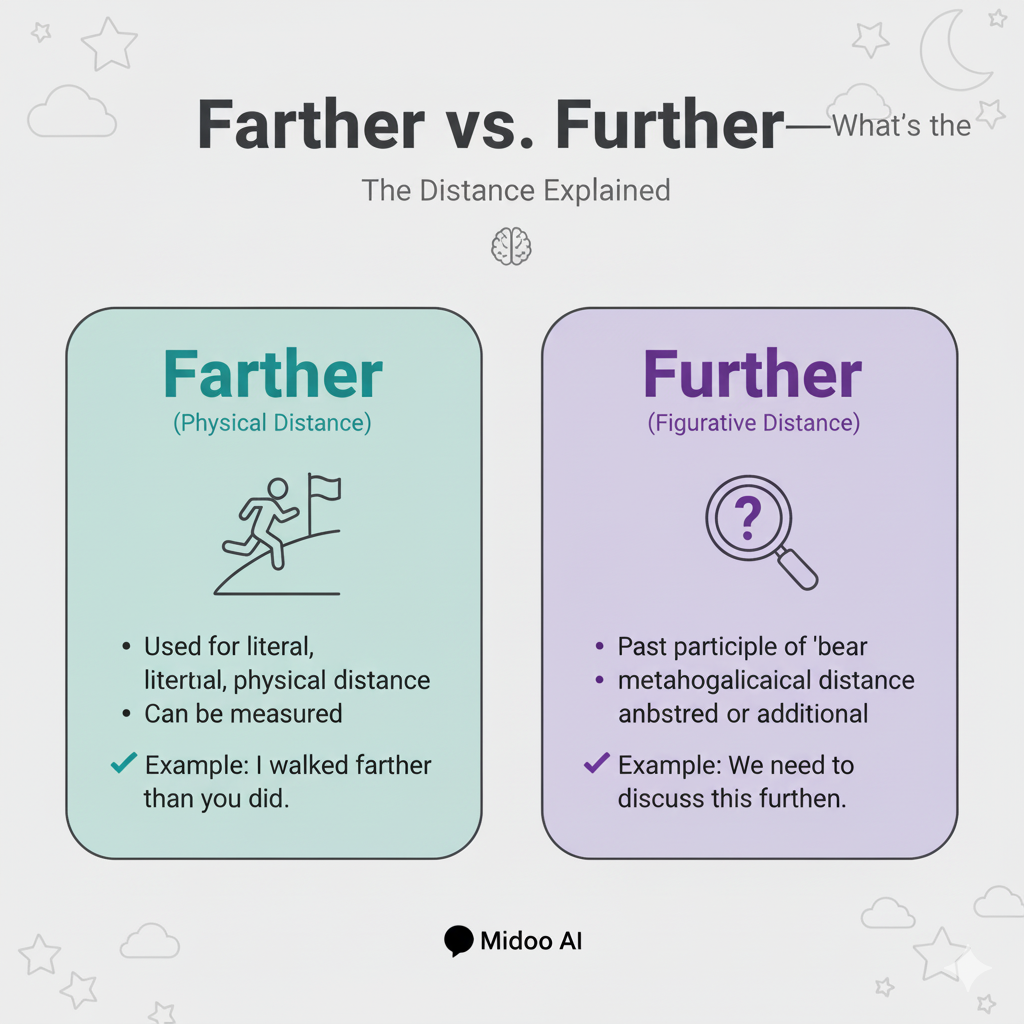Farther vs. Further—Learn the Subtle Difference

English is full of word pairs that look almost identical but carry subtle differences in meaning. One of the most common examples is farther and further.
At first glance, they seem to mean the same thing, and many people—even native speakers—use them interchangeably. However, there are important distinctions worth learning, especially if you want your writing to be precise and polished.
That’s where Midoo AI can help. Midoo AI makes grammar practice simple by breaking down confusing topics like farther vs. further into easy steps. With real-world examples, instant feedback, and interactive exercises, you’ll never have to second-guess which word to use again. Let’s dive into the differences and see how you can master these two terms.
What Does “Farther” Mean?
Farther refers to physical, measurable distance. It comes from the word far and almost always describes literal space between two points. If you’re talking about miles, steps, or actual locations, farther is the best choice.
Examples:
- The store is two blocks farther than the library.
- She ran farther than anyone else in the race.
- From the top of the hill, you can see much farther__.
- We hiked five miles farther before stopping to rest.
- The ball rolled farther than I expected.
Tip: If you can measure it, use farther. Think: farther = physical distance.
What Does “Further” Mean?
Further is more flexible. While it can also mean “greater distance,” it is most often used for figurative distance, progress, or additional information. In fact, in modern English, further is often the safer word when in doubt.
Examples:
- He decided to pursue the topic further in his research.
- Without further questions, let’s begin the meeting.
- She went further than expected to help her team succeed.
- For further details, check the company’s website.
- We need to explore this idea further before making a decision.
Tip: If the meaning is “in addition,” “to a greater extent,” or something abstract, choose further.
Where the Confusion Happens
Part of the difficulty is that both words originally meant the same thing, and over time their uses evolved. Today:
- In American English, writers usually keep farther for physical distance and further for figurative use.
- In British English, further is more common and often replaces farther in both literal and figurative contexts.
This overlap means that you won’t always be “wrong” if you mix them up, but careful writers pay attention to the nuance.
Quick Recap
- Farther → literal, physical distance (miles, steps, measurable space).
- Further → figurative distance, progress, or “in addition.”
👉 Example:
- The trail goes farther into the forest. (physical)
- We need to discuss this matter further__. (figurative)
Common Mistakes to Avoid
- Using farther in figurative contexts
❌ Let’s take this conversation farther.
✅ Let’s take this conversation further. - Forgetting that further also means “in addition”
✅ For further information, contact customer service. (farther would be wrong here.) - Assuming farther is always required for distance
- While farther is more precise, further is also widely accepted for physical distance, especially in British English.
How to Remember the Difference
- Farther → Far → Physical
- Further → Figurative / Future → Abstract or more
If you ever hesitate, choose further—it’s usually correct in modern usage.
Frequently Asked Questions
Q1: Can I always use “further” instead of “farther”?
In most cases, yes. Further works for both literal and figurative situations, though farther is more precise for physical distance in American English.
Q2: Is “farther” becoming outdated?
Not completely. While further is more common, farther is still used in academic writing, journalism, and formal contexts where measurable distance is emphasized.
Q3: What about in British English?
British English uses further more often, even for physical space. You might hear, “The shop is further down the road,” instead of “farther.”
Q4: Can “further” mean “more”?
Yes. Example: Without further delay, let’s begin. In this context, further means “additional.”
Q5: Is it wrong to say, “How much further is it?”
Not at all. That’s perfectly correct in both British and American English.
Final Thoughts from Midoo AI
Learning to distinguish between farther and further can feel tricky at first, but once you connect farther with physical space and further with figurative or additional meaning, it becomes much easier. And remember—if you’re unsure, further is usually the safe choice.
With Midoo AI, you can practice these kinds of confusing word pairs through real-world examples and personalized feedback, so your English gets clearer every day.